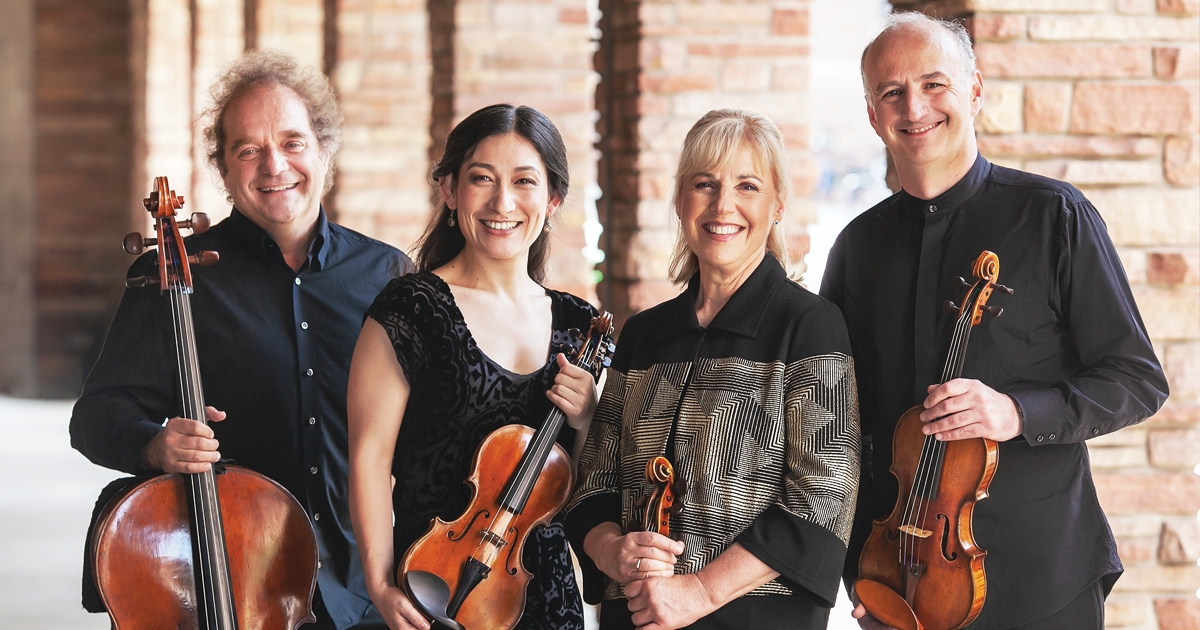Entering its 45th season, the Takács Quartet has impressed audiences all over the world — Europe, Asia and a whole list of North American engagements. On February 21, West Michiganders can get an up-close listen to this string quartet at Western Michigan University’s Dalton Center Recital Hall.
Formed in 1975, the Takács Quartet consists of Edward Dusinberre (violin), Harumi Rhodes (violin), Geraldine Walther (viola) and András Fejér (cello), who perform together in around 80 concerts a year. While Fejér was an original member, Walther joined 15 years ago after playing with the San Francisco Symphony for almost 30 years.
A fan from the beginning, Walther still feels honored to be welcomed into this quartet after all these years. “It’s a very special quartet,” he said. “I used to listen to all of their recordings before joining. I just loved the way they played.”
Aiming to maintain its original style, the Takács Quartet performs each song with a mix of vitality and sincere honesty, expressive character work and a deep rich sound.
“We’ve kept the same important qualities over all the years,” Walther said. “We try to make the music come alive for the audience. We find the beauty in the deep meanings that the composer was trying to impart in our own way. We are trying to be a voice to the composer who wrote the piece and do it to the best of our ability.”
Presented by the Fontana Music Chamber, the Takács Quartet’s performance will be held at 7:30 p.m. and tickets range $30-$40. The program consists of Fanny Mendelssohn’s String Quartet in E-flat Major, Bartók’s String Quartet No. 4, and Beethoven’s String Quartet in C Major and Opus 59 No. 3.
On Feb. 20 at 5 p.m., the Takács Quartet will hold a Strings Master Class at Kalamazoo Valley Museum’s Stryker Theatre, in conjunction with its performance. This master class is open to the public and no tickets are required to be part of the audience.
“It doesn’t really matter what level the students are for the master class. We always try and relate to whoever plays for us so that they can benefit from our experience with the piece. We can go from wherever they are. Everybody can learn something and have fun,” Walther said.
Compared to the rehearsals, performances are a whole different experience for each member of the quartet.
“We work on details in the rehearsals. In the concert, while we try to do those details too, you have to play for the audience, so we are not as careful in the current series. We try to give off our expressions and our imaginations and play in the moment to create something beautiful and to connect with the energy of the audience,” Walther said.
The audience’s energy level can impact their entire performance, he notes. “The audience changes everything. It matters what kind of audience is out there. It affects how we play and even changes the sound a bit.”
With only four members onstage, audiences can expect a more personal performance from string quartets as well. “You get to know them if you come hear them play. You form a relationship with those four players, and you’ll remember how you felt. String quartets are a very intimate medium. It makes people feel very special.”
It’s this one-of-a-kind connection that all performing arts productions share, in Walther’s view. Whether it’s a dance, theater or musical performance, seeing a show live is a drastically different experience than watching it on a screen.
“If you see something live, it’s going to be different from any other performance that those people have given,” Walther said.
“It reaches you in a different place when you make yourself open to the music and to the art form. It’s such a beautiful thing that a lot of people get hooked on live performances because that’s where it all happens.”
TAKÁCS QUARTET
Fontana Chamber Arts / Dalton Center Recital Hall
Feb. 21, 7:30 p.m.
Master Class on Feb. 20, 5 p.m.
fontanamusic.org





